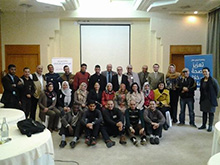 Journalists from Libya attend the first round of training held in TunisiaLibya which has recently gone through a major revolution was the first beneficiary of the new mainstreaming health promotion in the media training prgramme.
Journalists from Libya attend the first round of training held in TunisiaLibya which has recently gone through a major revolution was the first beneficiary of the new mainstreaming health promotion in the media training prgramme.
The pilot course was launched in January 2014 at WHO’s Global Centre for Training and Conferences in Tunis, Tunisia, with a group of 20 Libyan journalists who underwent 2 weeks of intensive training, combining theory and hands-on field work. Media experts from Thomson Reuters Foundation (TRF) and Agence France-Presse Foundation (AFPF), and the African Center of Training Journalists and Communicators (CAPJC) developed key reporting skills, and health experts from WHO, Tunisia and Libya provided an overview of public health issues within the Libyan context.
“In this interconnected world, health information is being disseminated at an unprecedented pace and the public is not always in a position to assess the accuracy of the information received, increasing their exposure to health risks,” said the WHO Representative in Libya Dr Jean Jabbour in his welcome remarks. “The health experts and media professionals sitting in this room have one common goal: we want to make sure that information we provide to the public is accurate and relevant, and allows people to make informed choices and decisions related to their health.”
“On the first day I learnt a number of tips about how to prepare a good news story. I am excited about doing more practical exercises and learning more about health issues in the region. As a radio presenter who focuses on health topics, it’s important I know more about public health issues in Libya,” said Dr Safeya Abdel Meguid Qashouta, a presenter with the Voice of Tripoli radio station.
Following the 2-week residential course trained media professionals underwent distance mentoring by renowned media experts for a period of 3 months to ensure maximum effectiveness of the training. Once they have presented their final projects and received certification, they will become members of a new network of health journalists, health professionals and media outlets that can quickly and effectively work together to address public health issues and improve the health literacy of the general public throughout the Region.


